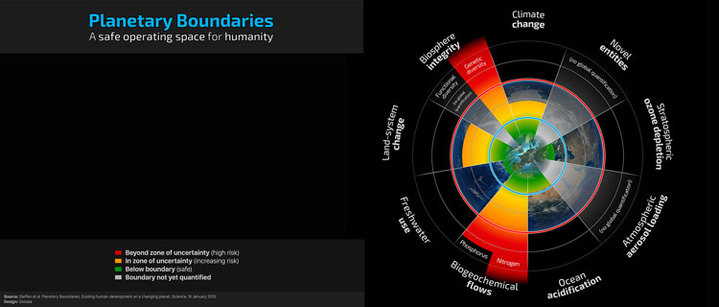
Unilever takes a similar approach. The company’s Sustainable Living Plan sets out goals under three overarching themes; pledging to help more than a billion people improve their health and hygiene by 2020 whilst enhancing livelihoods and halving the company’s environmental footprint. The Plan focusses on how Unilever can use their scale and reach to effect systemic change, and the level of ambition is high. The company states:
“We have set a bold ambition to achieve change within our own company – through our brands, innovation, sourcing and operations. But we are only one company among many and the change needed to tackle the world’s major social, environmental and economic issues is big - and urgent. What’s really needed are changes to the broader systems of which we are a part – whether that is in food, energy or health. We have decided to deepen our efforts in three areas where we have the scale, influence and resources to create ‘transformational change’. By that we mean fundamental change to whole systems, not simply incremental improvements.”
For companies where sustainability has become a central strategic driver, there has been a palpable shift away from incremental improvements in favour of audacious goals. IKEA’s Steve Howard is a strong proponent of this view, claiming ‘the only target worth setting is 100% change.’ The Guardian’s Jo Confino reinforces this: “The truth is that resource efficiency is only going to get us so far, and it's hardly the stuff of excitement that is going to get people leaping out of bed in the morning.”
This is not to say that companies should not use resources wisely, set targets for cutting carbon emissions and water usage, source responsibly, everything that falls within their traditional boundaries. Many of these initiatives save money and reduce exposure to risk. These activities make sense from an efficiency standpoint and from a purely ethical point of view- but they are quite simply the very minimum society and a prudent shareholder should expect.
Increasingly, the more progressive companies recognise that by harnessing commercial nous and capacity for innovation to tackle social and environmental challenges, they can open up new revenue streams and help to trigger systemic change, thus safeguarding their organisation’s long-term prospects. Unilever is amongst the private sector leaders which has also recognised the need to work more collaboratively with governments, NGOs and other players within its own sector to speed up progress- ‘by working together, we believe that fundamental change is possible in the near term.’ Regular readers will not be at all surprised to hear how much I am in favour of this partnership approach when executed well, for reasons I explain Here and Here. It’s also something the post-2015 Sustainable Development Agenda looks set to endorse.
This shift from corporate responsibility to a more deliberate social innovation strategy is also visible in the rise of corporate venture capital (CVC) investing, in which large companies take an equity stake in a business to which it also provides expertise and guidance. Crucially, CVC investors increasingly look for a positive social and/or environmental impact as well as a strategic match with their core business and a sound financial return. The Volans report ‘Investing in Breakthrough’ provides an interesting study of this trend, featuring case studies from Intel, GE, Patagonia and Pearson and highlighting the potential of corporate venture capital as a driver in the social economy.
I am encouraged by Vodafone and Unilever’s attempts to use their considerable resources for good. The execution may not be perfect- but their programmes share a willingness to go beyond operating responsibly, to think creatively about the transformational change they can effect using their organisation’s unique access to technology, skills, scale and influence. It is something Walmart CEO Doug McMillan and SVP Sustainability Kathleen McLaughlin call long-term capitalism. In a recent essay for McKinsey they observe:
“If in the past 20 years the discussion has been about the need for business to serve stakeholders beyond just the customer and the shareholder, the next 20 years will be about the need for companies to improve the networks and systems they depend on. Leading businesses are actively using their scale and their particular assets to accelerate progress on tough social and environmental issues”
Are there any downsides? There are vocal detractors, such as George Monbiot who forcefully question the right, and desirability of corporations to assume the role of societal do-gooders- attempting to tackle social ills that, in his view, should remain the domain of government and NGOs. Perhaps, also, you might reasonably argue that this focus on transformational solutions encourages a bias towards product and service innovation, feeding an obsession with growth at all costs when we are in need of innovative ideas to cement responsible operations, rein in consumption and bring resource use safely within planetary boundaries. This may be true, but handled right, and with sensitive leadership, I think the transformational trend could have many other benefits.
Harnessing the power, ingenuity and influence of the private sector for good has enormous potential. Not least- people will get this. Employees will feel galvanised by it in a way that they quite frankly don’t by a plea to put their recycling in the right box. Do it right, resource it well, and this is as exciting for employee engagement for sustainability as it is for the potential impact it could have on the wider world. This new appetite to tackle systemic change opens up all sorts of possibilities for cross-functional, cross-organisational and cross-sectoral project teams. It has always nagged at me that perhaps we have been trying to engage people on the wrong things- because tinkering is dull. It is still hugely important to manage operational impacts- but they should not spearhead our employee engagement efforts. Where the exciting stuff happens- the new business models, ideas, services, circular economy thinking- that’s where people will want to get involved- and where they will be able to use their existing skills most effectively.
There is an excellent organisation called the League of Intrapreneurs dedicated to supporting employees in large organisations to innovate for good, 'transforming business from the inside out'. If companies do more to legitimise this sort of intrapreneurial spirit, to encourage work on ‘transformational solutions’ such as those attempted by Vodafone and Unilever, I think we would find employees coming to work with a renewed sense of purpose.
And how powerful would that be?
by Jenny Ekelund
|
|
|



 RSS Feed
RSS Feed